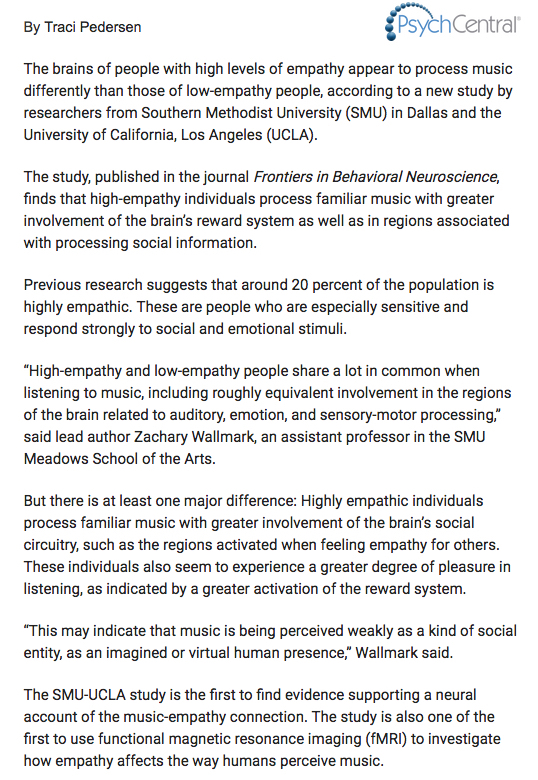
High-Empathy People May Process Music in Brain’s Social Areas
Inspiration and creativity epitomize positive energy: it’s seminal to being joyous and alive. You can’t be creative without inspiration. You’re not fighting the flow—you’re going with it.
Music is part of creativity. Listening to it, playing it, admiring it. Empathic people love music and find great satisfaction from it.
Creativity improves health: your body knows you’re happy and functions better. Emotionally, it triggers optimism, dreams, pizzazz. Inspiration is also a subtle energy you generate and exude. Others can sense these vibes; they effect how you’re perceived and who you attract. Inspired people radiate an undeniable glow.
The Power of Inspiration
When I’m aware of a journalist risking her welfare to report from war-torn Israel, a poet, or a mother–to my intuition they feel like bright sun. Their energy is contagious, intoxicating. I respond to a glimmer in their eyes, a confidence from living close to their truth. Talk about a way to magnetize people, whether friends, lovers, or in your career. Inspiration draws positive energy.
My patient, Pam, at thirty-five a physical therapist, couldn’t find a mate. She’d searched high and low: dating services, singles bars, parties, but no luck. In a session, she broke down sobbing: “What am I doing wrong?” I empathized with her heartache. Some roadblocks, though, aren’t amenable to logic. As I’ve seen with many patients, the cause is often energy based. Lovely and good-hearted as Pam was, I read her energy as dull, sleepy. For years, she’d functioned on automatic: home, work, chores, sleep. In a session she admitted, “Nothing much inspires me.” It seemed so.
Energy-wise I could feel Pam’s batteries were dead, aching for a jump start. So, our thrust became helping Pam intuitively identify her passion. That is, finding new signs of life in her being, listening for what moved her. Penetrating the bland was slogging work, but we stuck with it. She tried needlepoint and Bridge, activities her mother would’ve approved of, but alas, no real inspiration there.
Then one day, on a whim, she went sailing with a friend. That Spring afternoon, inspiration hit. Out at sea, her boat became surrounded by a pod of hunchback whales. Their massive grace and mysterious songs tapped an electricity in Pam. Those first moments, seeing their migration up close, she loved those beautiful, jeopardized creatures. From then on Pam’s inspiration became saving the whales. The blandness in her persona began to be replaced with joy. I could see it; others could too. No coincidence, soon after she met a man with whom she fell in love.
Inspiration brightens the light around you.
People instinctively respond. Without inspiration that light grows dim, as if you’re invisible. It’s the strangest thing: you’re intelligent, attractive, kind, but it seems that no one notices you. Inspiration is a way of switching your light on again.
I know well how the absence of inspiration can feel deadly. One winter I attended an academic conference in Turkey on Rumi, the thirteenth century Sufi, famous for his ecstatic love poetry. My companion had been invited to speak. You’d think such a gathering would emanate positive energy. Instead, we witnessed how academics, in droning monotones and timed fifteen minute talks, bled dry the highest passion.
At the break, when I commiserated about this calamity with Marcel Derkse, a therapist from the Netherlands, he described his work: “At our medical clinic, we consider lack of inspiration a sickness. I run a month-long, live-in program covered by medical insurance, devoted to helping patients re-inspire themselves. We teach them how to reconnect with the creative energy of life. We recognize the reality of suffering, but also that we can be an instrument of love. We emphasis poetry, music, and art as ways to creatively celebrate existence.”
Astonishing: in that instant, Marcel clarified for me a crucial element of positive energy. True emotional, physical, and spiritual well-being is contingent on inspiration; without it we’re in a chronic state of dis-ease. To maximize energy, we must search for inspiration until we find it.
An Inspired Life
All of us are entitled to an inspired life: passionate work and relationships, playful down time to refuel. Do what tickles you, large or small; don’t act just because you think you should. Artists rely on inspiration: it’s how they live. Similarly, we can make everyday a living art, a perspective I’ll train you in.
Sadly, our society doesn’t educate us about the value of inspiration. (Starting in kindergarten this should be part of Living 101.) So, as adults, many of us need to recapture it. Since inspiration hasn’t been a priority for most of us, this can be a marvelous experiment. Whether you’re ninety or nineteen, there’s not a moment to waste.
Take an Inspiration Inventory: Finding Passionate Work, Hobbies, and the Miracle of Small Moments.
Now’s your chance to investigate what does or doesn’t inspire you. The purpose: to honestly access where your energy goes so you can constructively re-route it. To remember all inspiring inklings, I suggest you keep a journal and review it. Don’t be discouraged if you’re stuck in a rut or feel far from inspired right now. This inventory will turn all that around. Re-inspiring your life takes courage. It’s a solution-oriented process of uncovering, then commencing change.
My focus will be helping you find work you truly love, or show you how to re-inspire your current job, even tiny bits of it–there’s always a way. Also to find a hobby, an inspired pursuit that isn’t your day job. A hobby that excites is a life force rejuvenator, not just something to busy bored housewives. Then we’ll go on to inspiring mundane moments. In each area, aim for a reverence and a creative energy surge. Throughout this inventory, the poet Rumi’s words will be our mantra:
“Let the beauty you love be what you do. There are hundreds of ways to kneel and kiss the ground.”


